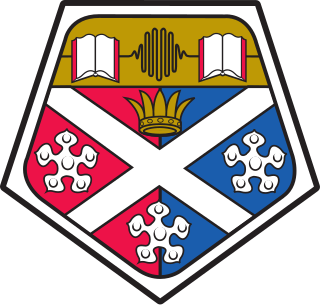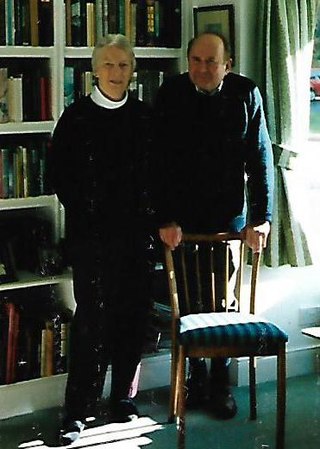
The University of Strathclyde is a public research university located in Glasgow, Scotland. Founded in 1796 as the Andersonian Institute, it is Glasgow's second-oldest university, having received its royal charter in 1964 as the first technological university in the United Kingdom. Taking its name from the historic Kingdom of Strathclyde, its combined enrollment of 25,000 undergraduate and graduate students ranks it Scotland's third-largest university, drawn with its staff from over 100 countries.

Robert Haldane Smith, Baron Smith of Kelvin, is a British businessman and former Governor of the British Broadcasting Corporation. Smith was knighted in 1999, appointed to the House of Lords as an independent crossbench peer in 2008, and appointed Knight of the Thistle in the 2014 New Year Honours. He was also appointed to the Order of the Companions of Honour in 2016.
Sir John Peebles Arbuthnott was a Scottish microbiologist who was Principal of the University of Strathclyde. He succeeded Lord Wilson of Tillyorn as President of The Royal Society of Edinburgh in October 2011 and was succeeded by Dame Jocelyn Bell Burnell in October 2014.

The Royal Scottish Geographical Society (RSGS) is an educational charity based in Perth, Scotland, founded in 1884. The purpose of the society is to advance the subject of geography worldwide, inspire people to learn more about the world around them, and provide a source of reliable and impartial geographical information.
Sir Gordon Smith Grieve Beveridge was a Scottish chemist. He served as president and vice-chancellor of Queen's University of Belfast, Northern Ireland, from 1986 to 1997. He was knighted in 1994 for his services to higher education and died in Belfast.

Allan Glen's School was, for most of its existence, a local authority, selective secondary school for boys in Glasgow, Scotland, charging nominal fees for tuition.

James Stuart "Jimmy" Gordon, Baron Gordon of Strathblane, was a Scottish business executive and member of the House of Lords.
Ronald McCaffer is Emeritus Professor of Construction Management at Loughborough University in Loughborough, England. He is a specialist in the management of the processes, technology, contractual and procurement systems of the construction industry.
Tan Sri Prof. Chin Fung Kee was a respected and outstanding Malaysian civil engineer in engineering practice, as well as engineering research and education. He is known for his excellence in geotechnical, structural and hydraulic engineering. He was a local pioneer engineer who played a key role in the development of engineering education, research and practice in the country. His knowledge and contributions benefited the engineering fraternity both nationally and internationally and his achievements were recognized worldwide.

The Institution of Engineers in Scotland (IES) is a multi-disciplinary professional body and learned society, founded in Scotland, for professional engineers in all disciplines and for those associated with or taking an interest in their work. Its main activities are an annual series of evening talks on engineering, open to all, and a range of school events aimed at encouraging young people to consider engineering careers. Between 1870 and 2020 the institution was known as the Institution of Engineers and Shipbuilders in Scotland (IESIS).

Sir Graham Hills was a physical chemist, principal of the University of Strathclyde, and a governor of the BBC. He was born in Southend-on-Sea, Essex and educated at Westcliff High School for Boys and Birkbeck College, London. He was knighted in 1988 for his services to education.
Sir Alistair George James MacFarlane was a Scottish electrical engineer and leading academic who served as Principal and Vice Chancellor of Heriot-Watt University, Edinburgh, and Rector, University of the Highlands and Islands.

Dame Lesley Anne Glover is a Scottish biologist and academic. She was Professor of molecular biology and cell biology at the University of Aberdeen before being named Vice Principal for External Affairs and Dean for Europe. She served as Chief Scientific Adviser to the President of the European Commission from 2012 to 2014. In 2018 she joined the Principal's senior advisory team at the University of Strathclyde.
Sir Horace William Alexander Francis CBE FREng is a British civil engineer.
Cheng Hon-kwan is a Hong Kong engineer and politician. He was the member of the Executive Council and Legislative Council of Hong Kong in the 1980s and was chairman of the Hong Kong Housing Authority from 2000 to 2002.
Ronald Nathan Arnold PhD (Sheffield) MS (Illinois) DSc DEng MIMechE MICivilE was a distinguished British engineer.
George Fleming is a Scottish civil engineer specialising in environmental issues. Educated at the Royal College of Science and Technology, Stanford University and the University of Strathclyde he is a doctor of philosophy. His research started with studies of the hydrology of the River Clyde that expanded to a range of subjects including, flood risk, dredging, nuclear waste management, decommissioning of North Sea platforms and contaminated land. He has written reports on flooding for the Institution of Civil Engineers and the British government. Fleming was involved in the planning stages of the Glasgow Garden Festival of 1988 and established a way of reusing dredgings from the Clyde to provide topsoil for the event. He has served as a non-executive director of British Waterways, Port of Tyne boards and for WRAP, a government quango whose aim was to promote recycling and resource efficiency. He is founder and chairman of the EnviroCentre environmental consultancy, of which his son, Duar, is managing director.
Michael Rex Horne was an English structural engineer, scientist and academic who pioneered the theory of the Plastic Design of Structures.
Sir Alan James Harris CBE was a British civil and structural engineer.








